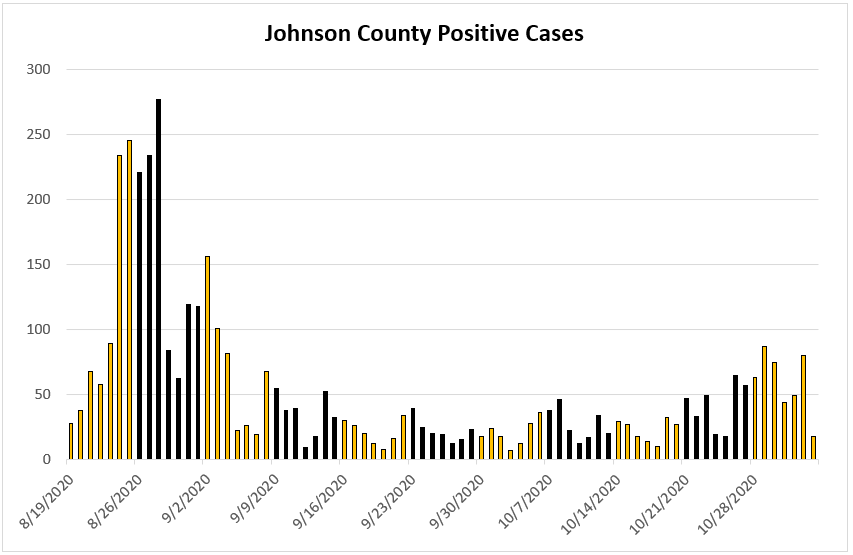UI Hospitals & Clinics CEO on the rise of COVID-19 cases in Iowa
In this Monday video conference with reporters, University of Iowa Hospitals & Clinics CEO Suresh Gunasekaran explains the alarming rise in COVID-19 numbers across the state and what Iowans can do to flatten the curve and prevent hospitals from becoming overwhelmed.
Surveillance testing pilot program
The University of Iowa is instituting a pilot program to provide additional COVID-19 testing options for student employees whose positions require some level of socially distanced, face-to-face interactions.
Beginning this month, the university will provide voluntary COVID-19 surveillance testing for residence assistants (RAs) in Housing and Dining. The university is starting with a single student employee group to determine how best to manage the testing appointments and processes. RAs provide a critical campus function, by advising, supporting, and living alongside other UI students in the residence halls. If the program is determined to be successful and scalable, the university will consider expanding it to other student employee groups.
The testing will be free for the students who wish to participate and will be conducted by Student Health, using the PCR test obtained by a nasopharyngeal swab and used by UI Health Care and the State Hygienic Lab. In addition, the university will continue to test all symptomatic individuals and asymptomatic individuals with a known COVID-19 exposure.
This pilot program aligns with the actions of our peer institutions and follows other proactive steps we have taken to minimize the spread of the virus, including:
- Reducing campus density
- Mandating face masks
- Providing protective equipment
- Installing plexiglass in visitor areas
- Modifying classrooms and facilities to promote social distancing
- Upgrading air filtration systems
- Enhancing cleaning and disinfection protocols
For more information on the pilot program, see the FAQ section of the UI COVID-19 website.
Mental health resources: Mindfulness-based stress reduction
Research suggests that mindfulness practice can positively affect stress resilience, physical and mental health, academic skills, self-regulation of emotional reactivity, interpersonal skills, general well-being, and happiness. Mindfulness programs are designed to assist people who want to learn to use their own internal resources to respond more skillfully to stress, medical and psychological conditions, and promote healthy living.
Several resources on campus can help you hone some of these stress reduction practices, including:
Employees:
- University of Iowa Hospitals & Clinics Mindfulness Programs
- LiveWell: Mindfulness Is Having a Moment
Students:
- Student Wellness Mindfulness Workshops
- University Counseling Service Mindfulness Matters series
For more information about mental health resources, see mentalhealth.uiowa.edu.
For counseling and support, the Employee Assistance Program offers confidential counseling at no cost for UI employees and their families; or University Counseling Service offers confidential counseling and support for students.
Campus operations
Please do your part to limit the spread of COVID-19 on campus and in the community. We must work together to flatten the curve flatten and prevent our hospitals from becoming overwhelmed. If necessary, will consider additional actions, in coordination with Johnson County Public Health, the Iowa Department of Public Health, and the Board of Regents, State of Iowa.

University of Iowa self-reported COVID-19 testing
These data reflect new cases since Nov. 2, 2020.
The University of Iowa has published an updated snapshot of self-reported positive COVID-19 tests from faculty, staff, and students.
Number of self-reported cases of COVID-19
Students
- New cases: 34
- Semester-to-date: 2,223
Employees
- New cases: 13
- Semester-to-date: 127
These numbers reflect only self-reported positive or presumed positive COVID-19 tests from UI faculty, staff, and students on the academic campus since Aug. 18, 2020. These data will not match data reported by UI Hospitals & Clinics or by the Iowa Department of Public Health for several reasons, including different testing time intervals and geographic scope. Students who also are employees of the university are only reported in the student number to avoid double counting. The UI has more than 30,000 students and nearly 30,000 employees. Many employees continue to work remotely but have self-reported to authorize sick leave.
Number of residence hall students in quarantine: 1*
Number of residence hall students in self-isolation: 8**
*Quarantine: Quarantine is used to keep someone who might have been exposed to COVID-19 away from others.
**Self-isolation: Isolation is used to separate people infected with the virus (those who are symptomatic and those with no symptoms) from people who are not infected.